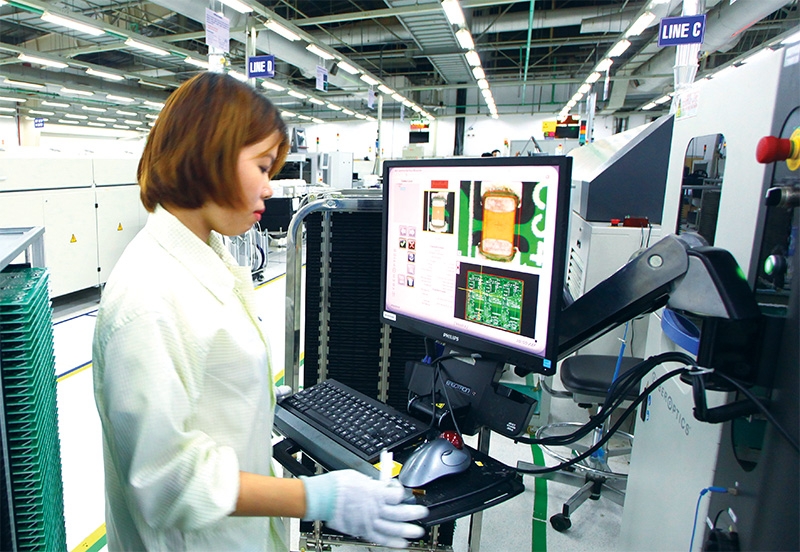Increasing business readiness for 4.0 era
 |
| Smart production requires highly-skilled and properly trained employees in order to prosper Photo: Le Toan |
Over the past few years, Vietnam’s industrial production has been developing quantitatively and qualitatively, with industrial sectors’ structures changing positively. The industrial sector’s competitiveness has gradually improved, with the lead of some key products. There have been some strong economic groups that could compete on the global stage.
 |
| Kieu Nguyen Viet Ha, vice head of the Planning and General Affairs Division under the Ministry of Industry and Trade’s Department of Science and Technology |
However, the sector is also facing some problems. For example, the labour productivity of the economy in general and of the sector in particular remains low, especially in manufacturing and processing.
Industrial production depends largely on foreign-invested enterprises and on a big volume of imported goods. Meanwhile, technological transfer from these enterprises to Vietnamese businesses is also limited. Reports from the Ministry of Science and Technology show that the majority of technological transfer contracts are focused on technological process transfer (73 per cent), technical assistance (77 per cent), training (71 per cent), and technological transfer (13 per cent). The total factor productivity’s contribution to the country’s GDP is about 29 per cent only.
Vietnamese enterprises are facing increasing pressure in competition and development amid the trend of developing and applying achievements of Industry 4.0. In fact, Vietnam’s readiness for Industry 4.0 remains limited now, both in the whole economy and in enterprises.
According to the Readiness for the Future of Production Report 2018, by the World Economic Forum and consultancy firm A.T. Kearney, Vietnam was ranked 40th in tech and innovation in the list of nascent nations with Industry 4.0.
In terms of human resources, Vietnam was ranked 70th, in which the indexes on high-skilled labourers and the university quality were also low, at 81st and 75th.
Regarding enterprises, a recent survey by the Ministry of Industry and Trade showed that the majority of industrial enterprises are at the starting point towards an Industry 4.0 future.
Enterprises’ ability in accessing Industry 4.0 is constrained by some obstructions. For example, they have no specific strategy on approach to Industry 4.0, including strategies on their own development and on digital transformation, investment, and technological renovation. Moreover, the ability in data digitalisation and connectivity within businesses and between them and their partners remains limited.
Also, not many can develop their own smart products, which are the basic foundations for them to collect information and then develop new products and business models. Corporate and technological governance models from Industry 4.0 are applied on a very small scale.
Besides, enterprises are also limited by a lack of a strong ecosystem that can help them conduct digital transformation, while their own capacity for this job is weak. Also, consultancy units lack the tools and standards to provide enterprises solutions.
Effective tactics
To weather all difficulties and turn challenges into opportunities for development, Vietnamese enterprises need to increase their readiness for Industry 4.0, in addition to support from state agencies.
Firstly, they need to build up their own digital transformation strategy, which needs to take into account their current capacity and the requirements of smart industrial development. Besides, the strategy also needs to specify priorities and identify challenges of enterprise development, and take into account the effectiveness of digital transformation.
To support enterprises in this digital transformation, many nations and international organisations have built up sets of indexes on assessing enterprises’ readiness for Industry 4.0.
For example, while Singapore has devised its Smart Industry Readiness Index and Indonesia has its Industry 4.0 Readiness Index, the German Engineering Federation has developed the Smart Industry 4.0 Readiness Online Self-Check. In addition, PricewaterhouseCoopers also has the Industry 4.0/Digital Operations Self-Assessment.
These tools will help raise enterprise awareness, assess their development situation, and propose digital transformation roadmaps. The construction or selection of an approach method or a tool suitable to Vietnamese enterprises is one of the big priorities for the state. This process needs to be conducted based on specific experiments and assessments for different enterprises in different sectors. This is also an urgent need for consultancy firms that provide digital transformation solutions for enterprises.
Secondly, businesses need to materialise their digital transformation strategies soon by focusing on technological investment and renovation, in which digital transformation is one of the first steps in constructing a smart factory.
Enterprise investment should be focused on enhancing digitalisation in collecting, linking, sharing, and processing data. The application of new technologies and establishing governance systems based on data in the whole factory’s operation process and supply chain is necessary to improve enterprises’ operations.
The state’s support for enterprises in this stage is creating a fairer and more favourable business and investment climate, so that enterprises can further develop. Policies on financial support in enterprises’ investment and innovation activities need to create breakthroughs that can assist enterprises in applying high technology from Industry 4.0.
Enterprise-support programmes via information provision and connecting businesses with able solution providers, creating big models in digital transformation, and developing smart factory models are important tools to spur the development of enterprises across the country.
Besides, the state would need to introduce solutions to improve the capacity of scientific and technological organisations, developing innovation centres, and then forming a network to support enterprises in digital transformation.
Specifically, such a network is aimed to support enterprises in human resources training, provide them with consultancy in digital transformation, and to implement scientific research activities with a focus laid on researching, applying, and transferring Industry 4.0 technology to industrial manufacturing sectors.
A flexible foundation
Thirdly, businesses also need to develop smart products and new business models based on data which can create new values. This is a higher level of enterprises. Via the integration and supplementation of new functions to collect information and data from users and customers, enterprises can grasp changes in product consumption, and therefrom can perform timely and suitable adjustments.
Industry 4.0 technology is creating numerous opportunities for enterprises to form a flexible production model in which products can be customised for each individual customer. With this strong foundation, services that are based on data and new business models will be formed and developed, helping further promote enterprises’ development.
Here in Vietnam, the state’s role is to develop a management mechanism suitable to the digital business climate, making it favourable for innovation. The state needs to soon enact a pilot institutional framework which can control technologies, products, services, and new business models created by Industry 4.0. Furthermore, the state should also construct experimental areas for technological firms based on advanced models in the world.
Lastly, it is necessary to develop highly-skilled human resources that can meet the requirements of smart production at businesses. There should also be a suitable organisational structure in enterprises in order for them to supervise and implement their digital transformation plans and strategies.
Enterprises must be prioritised in training with the supplementation of new skills suitable to Industry 4.0. Such skills include data analysis, software usage, information security, automisation, IT, and a good command of systems.
In addition, businesses also need to develop a system with indexes used for following and assessing digital transformation.
New requirements from enterprises will force educational and training activities to renew both in content, curriculums, and form. The state needs to give incentives and favourable mechanisms to individuals, organisations, and enterprises engaging in educational and training activities which can create products in service of the digital economy. Besides that, the state also needs to boost vocational training and support labourers in skill training when they change their jobs.
Thus it can be said that Industry 4.0 is bringing enterprises both challenges and opportunities. Whether they can lag behind or move forward largely depends on their mindset and actions.
Actively joining Industry 4.0 is both an objective requirement and an urgent and long-term strategic duty for the whole political system and the entire society. It closely links with the country’s international integration, and is now being materialised by concrete actions from the government and localities.
What the stars mean:
★ Poor ★ ★ Promising ★★★ Good ★★★★ Very good ★★★★★ Exceptional
Themes: Digital Transformation
- Dassault Systèmes and Nvidia to build platform powering virtual twins
- Sci-tech sector sees January revenue growth of 23 per cent
- Advanced semiconductor testing and packaging plant to become operational in 2027
- BIM and ISO 19650 seen as key to improving project efficiency
- Viettel starts construction of semiconductor chip production plant
Related Contents
Latest News
More News
- Hermes joins Long Thanh cargo terminal development (February 04, 2026 | 15:59)
- SCG enhances production and distribution in Vietnam (February 04, 2026 | 08:00)
- UNIVACCO strengthens Asia expansion with Vietnam facility (February 03, 2026 | 08:00)
- Cai Mep Ha Port project wins approval with $1.95bn investment (February 02, 2026 | 16:17)
- Repositioning Vietnam in Asia’s manufacturing race (February 02, 2026 | 16:00)
- Manufacturing growth remains solid in early 2026 (February 02, 2026 | 15:28)
- Navigating venture capital trends across the continent (February 02, 2026 | 14:00)
- Motivations to achieve high growth (February 02, 2026 | 11:00)
- Capacity and regulations among British areas of expertise in IFCs (February 02, 2026 | 09:09)
- Transition underway in German investment across Vietnam (February 02, 2026 | 08:00)

 Tag:
Tag:




















 Mobile Version
Mobile Version